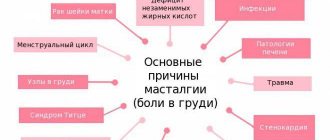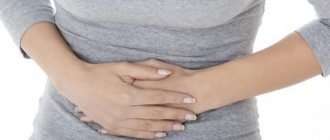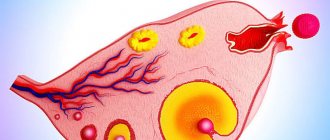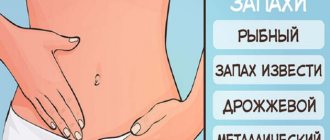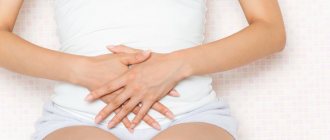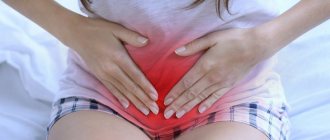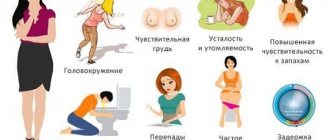Ivan Drozdov 03/26/2019 4 Comments
Headache is quite often a symptom of menstrual syndrome. Many women have a headache even before menstruation, and the general condition is aggravated by unpleasant sensations in the stomach, dizziness, nausea, and emotional outbursts. After the end of menstruation, the pain usually goes away and the woman feels relief, but this does not mean that the problem has disappeared. Its complete elimination is possible only after identifying the cause of painful discomfort.
Symptoms
Pain often occurs before and during menstruation. Main signs of headache:
- The appearance of nausea, sometimes vomiting occurs;
- Often, blood pressure rises during menstruation;
- Decreased appetite;
- The appearance of pain in one part of the head;
- Prolonged throbbing pain;
- Sudden changes in mood;
- Heartache;
- Sleep problems;
- Fear of sharp sounds, light, strong smells.
Often during PMS, pain occurs in the lower back, lower abdomen, and mammary glands. Migraines can also cause minor gastrointestinal upset. This occurs because the organs inside swell and put pressure on the intestines, a symptom that usually goes away once bleeding begins.
Symptoms
Headache before menstruation is not the only negative manifestation of this period.
There are quite a lot of symptoms that are inherent in the period before menstruation; they are conventionally divided into two groups: psychoneurological and somatic signs. The first group includes mood swings, nervousness, depression, apathy, difficulty concentrating, aggressiveness, fatigue, decreased appetite and sexual desire.
Somatic manifestations - increased sensitivity of the mammary glands, bloating, pain in the lower part. The tissues may swell and you may feel like your throat is hurting. Headaches of varying severity, pain in joints and muscles, skin rashes, nausea and vomiting are also common symptoms.
When examining a patient’s condition, they are mainly guided not by the clinical picture, since manifestations of PMS are not typical and can arise for a number of other reasons. Pay attention to the regularity of their occurrence, whether the headache occurs every month or the pain is not systematic. If negative sensations begin in the second phase of the cycle, gradually increase and disappear on the first day of bleeding, then they are almost certainly associated with menstruation.
Causes
It is imperative to find out the causes of headaches during menstruation, so that in the future the attending physician can prescribe effective treatment. Unpleasant sensations often appear due to changes in blood pressure and water retention in the body. Pain during menstrual bleeding may intensify, causing serious discomfort. In addition, there are a number of factors that cause the disease:
- It may manifest itself as a result of chronic fatigue syndrome;
- Side effect from birth control medications;
- Phlebeurysm;
- Physiological location of the uterus;
- Malfunction of the reproductive and endocrine glands;
- Sometimes the female body produces too much of the hormone prostaglandin, which is responsible for the normal functioning of the female genital organs. Its imbalance in the body leads to the fact that the muscles of the uterus begin to contract more strongly, which causes pain.
If discomfort occurs in the head, a woman should consult a doctor to identify possible diseases that could become a serious threat to health. Today there are several types of pathologies.
Vascular pathologies
Ailments often appear due to the fact that the walls of blood vessels lose their elasticity. During menstruation, with vascular pathology, the load on the capillaries, veins and arteries increases, and pain appears in the head area.
Intestinal dysfunction
When menstruation begins, the female body becomes intoxicated and may experience a headache. Many begin to feel sick, their health worsens, and sometimes diarrhea or constipation occurs.
Anemia
When there are insufficient red blood cells, the transport of oxygen to brain cells is impaired as a result. This causes oxygen starvation and severe headaches during menstruation.
Cervical osteochondrosis
Often severe headaches during menstruation are tormented due to the manifestation of an illness such as cervical osteochondrosis. In this case, the vessels of the neck are pinched, which prevents the blood from properly supplying the brain with oxygen. If the disease is severely advanced, it can cause dizziness and even fainting.
Hormonal disbalance
Many women who have reached the age of forty experience a malfunction of the thyroid and adrenal glands. Because of this, hormonal imbalance occurs. Irritability appears, fluid begins to stagnate inside the tissues and, as a result, a feeling of premenstrual pain in the parietal and occipital zone.
Migraine
With this pathology, a person develops a fear of light, loud sounds and strong odors. They can cause nausea, vomiting and stinging of the eyes. In this case, the whole process is very painful. The sharp pain may not stop for about two to three days.
Read more: menstrual migraine
Taking hormonal contraceptives
At first, taking the drug may cause pain, but after prolonged use the body gets used to the contraceptive, and the discomfort goes away.
Emotional instability
Mood swings are also added to the general discomfort before menstruation and during menstruation themselves. Many women are very stressed during this period. But, despite such changes, it is possible and even necessary to lead a normal life. Try not to be nervous and stay positive. After menstruation, a woman’s hormonal balance is restored and her health improves. You can take preventive measures before menstruation; a bath with essential oils, mint tea, and massage cope well with stress. All this will relieve unnecessary tension and pain in the head.
Gynecology
Painful symptoms appear if a woman has gynecological diseases: adenomyosis, algomenorrhea, inflammation of the genital organs. First, you should contact a gynecologist who will conduct an examination and give directions for the necessary tests and recommendations.
What explains the condition
Headaches before menstruation are caused by the following reasons, which should be described in more detail:
- hormonal changes;
- failure of water-salt balance;
- migraine.
Hormonal changes
During ovulation, progesterone production increases, while estrogen levels decrease. The processes taking place in the body are aimed at creating the necessary conditions to bear the fruit. If fertilization of the egg does not occur, the hormone level changes again. Such fluctuations cause severe headaches in some women.
Changes in water-salt balance
Just before the end of the menstrual cycle, progesterone begins to decrease, and estrogen rises to its previous level. Such fluctuations often cause swelling of the face, arms, legs and even the brain. Swelling in the area of the hypothalamus can cause throbbing, pressing pain in the back of the head and parietal region.
Migraine pain
Not many women suffer from frequent headaches, the intensity of which increases during PMS. This condition is called migraine, and it is characterized by a combination of differences from a typical headache:
- the pain may be short-term or last several days;
- pain may be felt only on one side of the head;
- migraine can cause a complete lack of desire to eat, even causing an attack of nausea;
- pain can provoke aversion to light, certain tastes, and aromas.
It is very difficult to cope with migraines on your own; even strong painkillers cannot always relieve the pain. All that remains is to wait out the time allotted for the migraine and gradually feel the fading of the pain.
How to prevent GB
You can rid yourself of throbbing headaches by following recommendations such as:
- Maintaining a daily routine;
- Getting rid of bad habits;
- Maintaining order in the house (doing wet cleaning and airing);
- Staying in the fresh air;
- Drinking large quantities of water;
- Pay attention to your health;
- Physical activity;
- Taking vitamin complexes.
If you follow these rules, your well-being these days will improve significantly and headaches will no longer remind you of them.
Osteochondrosis
Cervical osteochondrosis is the cause of frequent headaches during menstruation. With osteochondrosis, changes occur in the vertebrae: salt shoots (osteophytes) appear. They compress blood vessels (carrying blood to the brain) and nerve fibers (connecting the brain center with other organs). Between menstruation (which is physiological stress), the body adapts, pain is not felt. On critical days, the adaptive reaction is not enough. The brain and other organs require increased amounts of oxygen. And a compressed vessel is not able to ensure its supply. Appears.
Lack of oxygen causes dizziness and loss of consciousness. Dizziness during menstruation is less common, but is also a consequence of an exacerbation of an existing disease.
Menstrual headaches associated with osteochondrosis can be treated with a massage of the neck and shoulder area and exercises for the cervical spine.
Anemia is a blood disease. With anemia, there are not enough red blood cells (carrying oxygen) in its composition. Since the brain requires more oxygen on critical days, the effects of anemia are more pronounced and cause headaches. You can only get rid of pain with long-term therapy. To treat anemia with natural preparations, fresh green juice or green salads are used. They supply green chlorophyll, which is an analogue of the red blood cell molecule.
Treatment
Treatment is often required for headaches during menstruation to go away. To do this, you need to consult a doctor. There is no need to endure discomfort under any circumstances. The specialist will prescribe treatment, thanks to which the woman will be able to lead a full life. Pain syndrome is treated by a gynecologist and a neurologist. They will order an examination and select medications. Typically, therapy takes place in several stages:
- The patient is prescribed a vitamin complex. Some of them need to be taken before or after menstruation.
- Contraceptives that normalize the functions of the glands.
- Rest;
- Walks in the open air.
- Adequate 8-hour sleep and proper nutrition. For prevention, you should eat oatmeal, raw carrots, cabbage, fresh herbs, chicken or turkey.
If you have a headache during menstruation, it is important to exclude from your diet: pork, beef, sweets, flour, too strong coffee.
Include in your diet foods that will allow the body to get rid of fluid: watermelon, persimmon, melon, plum, greens, salads, boiled meat or fish. Coffee and green tea help get rid of headaches. It is important to avoid disturbing the water balance in the body, so it is recommended to drink clean, still water.
Poor bowel function
Headache during menstruation may be a consequence of internal intoxication. During menstruation, waste products present in various organs are released into the blood. The body is cleansed. The blood flow accelerates in order to remove the resulting ballast. The blood discharges ballast and harmful substances into the intestines, where they are collected in feces and excreted during bowel movements. If the intestines are clogged with sediment, its peristalsis is weakened, and it is unable to fully remove toxins. Their reverse absorption occurs, the blood carries them to organs and tissues. This phenomenon is intoxication. Toxic substances from the intestines enter the brain, internal organs, and muscle tissue through the blood. That's why not only your head can hurt during your period. Weakness or aches throughout the body are often felt.
The physiological process of internal cleansing begins before menstruation. When the body cannot cope with the removal of toxins, the headache before menstruation is the same as during menstruation.
To reduce headaches, intestinal cleansing measures help: laxative herbs and cleansing enema.
Drugs
During menstruation, non-steroidal anti-inflammatory drugs are mainly prescribed:
- It has exactly the same substance in its composition as in Nurofen. Doctors prescribe it to patients whose pain is moderate. Take after meals. If symptoms appear systematically, then the medicine should be taken for several days three times a day every four hours
- Citramon - this medicine contains acetylsalicylic acid, which quickly relieves unpleasant symptoms. One dose of medication and the analgesic effect is enough for six hours;
- Nurofen - this drug contains the substance Ibuprofen, which can relieve a person from cramps for a short time. The effect of the medicine lasts 8 hours.
All of the above tablets for headaches can be taken without consulting a doctor.
Headache during menstruation, which is treated in a timely manner, goes away quickly if you take Sumatripan and Zolmitripan. But first you need to consult a specialist.
Also, in addition to medications, doctors prescribe combined oral contraceptives, which include estrogen and gestagens. The use of any of these two drugs requires a mandatory consultation with a gynecologist. The doctor will prescribe the drug and select the dosage.
Why does my head hurt during menstruation?
Many women who experience headaches during menstrual periods have noted that they are sharp, pulsating in nature, making it difficult to look, and sometimes even just to look away. The reasons for this phenomenon lie in a spasm that affects the blood vessels. Their sudden expansion leads to severe irritation of pain receptors.
Migraine that occurs during menstruation requires immediate treatment.
Ignoring the disease is fraught with the appearance of neurological complications. In most cases, neurologists prescribe pills for PMS from a series of triptans:
- Sumatriptan;
- Eletriptan;
- Zolmitriptan.
The pain syndrome caused by migraine in combination with osteochondrosis of the cervical vertebrae is perfectly relieved with the help of Ibuprofen. For a quick effect, capsules from a number of analgesics can also help:
- Nurofen;
- Analgin;
- No-shpa;
- Paracetamol.
Analgesics can help and eliminate discomfort, but drinking them constantly is dangerous to your health!
It is worth noting that experts strongly discourage self-medication. Each of the above drugs has a number of contraindications and side effects. Before using any medications, a woman should consult with her doctor to prescribe the correct dosage and the balance of benefit and harm from the medication!
Remember that long-term use of analgesics can be addictive!
Folk remedies
Headaches during menstruation will go away if you use folk remedies. For example, take decoctions of herbs such as: bear ears, nettle, oregano, ailment. These plants have a good diuretic effect. Tea with mint, lemon balm or chamomile helps well. Aromatherapy copes well with the discomfort; you can rub in one drop of essential oil of mint, rosemary, sandalwood or lemon balm.
Massage of the temples, back of the head and cervical region is also useful. A cold compress will help relieve the condition. To do this, you will need a wet towel or a heating pad filled with cold water. The compress should be kept on the affected part of the head for 20 minutes.
If desired, you can prepare a decoction of linden, chamomile, lemon balm, yarrow and plantain. The collection must be poured with boiling water and left for two hours. After this, the resulting infusion must be filtered. With the help of this folk remedy, you can quickly get rid of ailments, and the body will receive vitamins that are important for it. To get results, you should drink two glasses every day.
Water pepper is also suitable for relieving attacks. Take two tablespoons of the dried plant and pour in 500 ml of boiling water. The decoction is taken 100 ml three times a day. If the PMS headache is moderate, then sleep, massage, or a relaxing bath with essential oils will help get rid of it.
You should not let menstrual problems take their course, because a headache on menstrual periods can signal an illness. Therefore, such headache symptoms are a reason to contact a competent specialist to find out the cause of this condition. To prevent diseases, it is recommended to undergo routine medical examinations, which will show what measures need to be taken to treat cephalalgia.
If the patient follows all the doctor’s instructions, she will soon be able to get rid of painful attacks and avoid unpleasant consequences associated with diseases.
Ways to deal with headaches before menstruation
The main method of relieving headaches is taking painkillers. Preference should be given to non-steroidal anti-inflammatory drugs - Nurofen, Nise, Paracetamol. Headache associated with migraine is not eliminated by non-steroidal drugs; Special drugs from the group of triptans have been developed for it - “Sumatriptan”, “Amigrenin”.
The intensity of headaches can be reduced using non-drug methods:
- A cold compress on the forehead and temples will help constrict the blood vessels.
- Daytime sleep in a dark, well-ventilated area.
- Aromatherapy with lavender essential oils.
